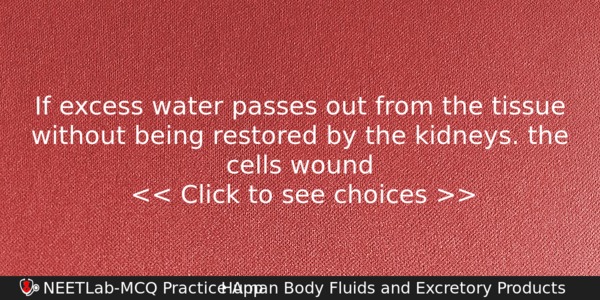| ⇦ | 
| ⇨ |
If excess water passes out from the tissue without being restored by the kidneys. the cells wound
Options
(a) Burst open and die
(b) Take water from the plasma
(c) Not be affected at all
(d) Imbibe water and then undergo plasmolysis
Correct Answer:
Not be affected at all
Explanation:
Excess water in the blood affects the osmoreceptors present in hypothalamus and volume receptors present in left atrium, ventricles and pulmonary veins. This causes ADH release so that body hydration is regulated by removal of excess water by kidney. Individual cells have no role to play in this process.
Related Questions: - The smallest segment of DNA which helps to detect the presence of a gene or a long
- Human urine is usually acidic because :
- The animal which has oval RBC is
- The Most extensively used bacteria in genetic engineering is
- DDT is
Topics: Human Body Fluids and Excretory Products
(197)
Subject: Biology
(4253)
Important MCQs Based on Medical Entrance Examinations To Improve Your NEET Score
- The smallest segment of DNA which helps to detect the presence of a gene or a long
- Human urine is usually acidic because :
- The animal which has oval RBC is
- The Most extensively used bacteria in genetic engineering is
- DDT is
Topics: Human Body Fluids and Excretory Products (197)
Subject: Biology (4253)
Important MCQs Based on Medical Entrance Examinations To Improve Your NEET Score
18000+ students are using NEETLab to improve their score. What about you?
Solve Previous Year MCQs, Mock Tests, Topicwise Practice Tests, Identify Weak Topics, Formula Flash cards and much more is available in NEETLab Android App to improve your NEET score.
Share this page with your friends

Leave a Reply